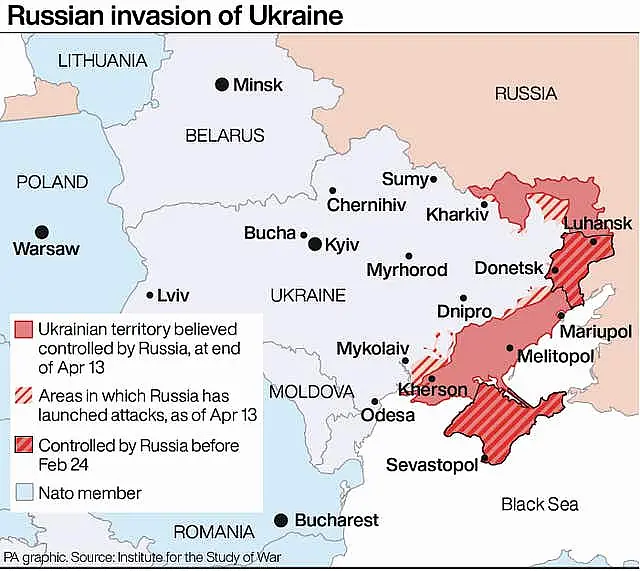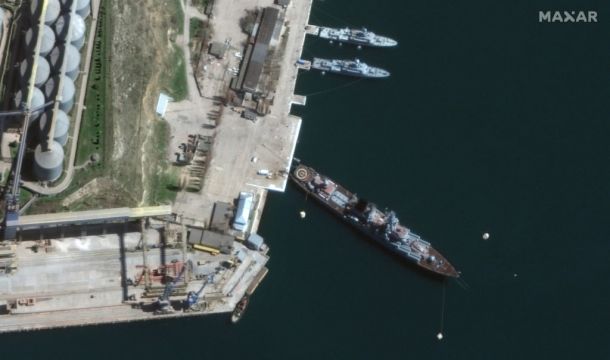Ukrainian officials have said that their forces hit the flagship of Russia’s Black Sea fleet with missiles overnight, though Russia said the Moskva was badly damaged by a fire that forced the warship’s evacuation and was still afloat.
The loss of the warship named after the Russian capital would be a major military and symbolic defeat for Moscow as its troops regroup for a renewed offensive in eastern Ukraine after retreating from much of the north, including the capital.
Russia did not acknowledge any attack but said a fire aboard the warship, which would typically have 500 sailors on board, forced the entire crew to evacuate the vessel.
It later said the fire had been contained and that the ship would be towed to port with its guided missile launchers intact.

The ship carries 16 missiles, and its removal from combat would greatly reduce Russia’s firepower in the Black Sea.
Regardless of the extent of the damage, any attack would represent a major blow to Russian prestige seven weeks into a war that is already widely seen as a historic blunder.
It was not immediately possible to reconcile the vastly different accounts, and cloud cover made it impossible to locate the ship or determine its condition based on satellite photos.
There was even some caution from Ukrainian officials: one said the ship sank, and a video from its armed forces described it overturning and beginning to sink, but another official refused to confirm that.
The news of damage to the ship came hours after some of Ukraine’s allies sought to rally new support for the embattled country.
On a visit with leaders from three other EU countries on Russia’s doorstep who fear they could next be in Moscow’s sights, Lithuanian President Gitanas Nauseda declared that “the fight for Europe’s future is happening here.”
Meanwhile, US President Joe Biden, who called Russia’s actions in Ukraine “a genocide” this week, approved 800 million dollars (£613 million) in new military assistance to Kyiv.
He said weapons from the West have sustained Ukraine’s fight so far and “we cannot rest now”.

The news of the flagship’s damage overshadowed Russian claims of advances in the southern port city of Mariupol, where they have been battling the Ukrainians since the early days of the invasion in some of the heaviest fighting of the war – at a horrific cost to civilians.
Russian Defence Ministry spokesman Major General Igor Konashenkov said on Wednesday that 1,026 troops from the Ukrainian 36th Marine Brigade surrendered at a metals factory in the city.
But Vadym Denysenko, adviser to Ukraine’s interior minister, rejected the claim, telling Current Time TV that “the battle over the seaport is still ongoing today”.
It was unclear when or over what time period a surrender may have occurred or how many forces were still defending Mariupol.
Russian state television broadcast footage that it said was from Mariupol showing dozens of men in camouflage walking with their hands up and carrying others on stretchers.
One man held a white flag.
Mariupol’s capture is critical for Russia because it would put a swathe of territory in its control that would allow its forces in the south, who came up through the annexed Crimean Peninsula, to link up with troops in the eastern Donbas region, Ukraine’s industrial heartland and the target of the coming offensive.
Moscow-backed separatists have been battling Ukraine in the Donbas since 2014, the same year Russia seized Crimea.

Russia has recognised the independence of the rebel regions in the Donbas.
But the loss of the Moskva could set those efforts back.
Satellite photos from Planet Labs PBC show the Moskva steaming out of the port of Sevastopol on the Crimean Peninsula on Sunday.
Maksym Marchenko, the governor of the Odesa region, across the Black Sea to the north-west of Sevastopol, said the Ukrainians struck the ship with two Neptune missiles and caused “serious damage”.
Oleksiy Arestovych, an adviser to Ukraine’s president, then said the ship sank, calling it an event of “colossal significance”.
In a video posted by Operation Command South of Ukraine’s military, an official said poor weather and explosions “overturned the cruiser and it began to sink”.
Yuriy Sak, an adviser to Ukraine’s defence minister, later said he was unable to confirm that the ship was sunk or even hit by Ukrainian forces.
He said he was aware of the comments by other Ukrainian officials but “could neither confirm nor deny” what happened.

He told the Associated Press (AP) that the warship was capable of launching 16 long-range cruise missiles.
“If or when this is confirmed, if it is confirmed, we can only have a sigh of relief because this means that fewer missiles will reach Ukrainian cities,” he said.
Russia’s Defence Ministry said ammunition on board detonated as a result of a fire, without saying what caused the blaze.
It later said the ship was afloat and would be towed in for repairs.
It said its “main missile weapons” were not damaged.
In addition to the cruise missiles, the warship also had air-defence missiles and other guns.
The Neptune is an anti-ship missile that was recently developed by Ukraine and based on an earlier Soviet design.
The launchers are mounted on trucks stationed near the coast and, according to the Washington-based Centre for Strategic and International Studies, the missiles can hit targets up to 175 miles away.

The US was not able to confirm Ukraine’s claims of striking the warship, US national security adviser Jake Sullivan said on Thursday.
Still, he called it “a big blow to Russia”.
“They’ve had to kind of choose between two stories: One story is that it was just incompetence, and the other was that they came under attack, and neither is a particularly good outcome for them,” Mr Sullivan told the Economic Club of Washington.
The Moskva was reportedly the warship that called on Ukrainian soldiers stationed on Snake Island in the Black Sea to surrender in a stand-off in the war’s early days.
In an audio widely circulated online, the soldier responds: “Russian warship, go (expletive) yourself.”
The AP could not independently verify the incident, but Ukraine and its supporters consider it an iconic moment of defiance, and the country recently unveiled a postage stamp commemorating it.
Russia invaded on February 24 with the goal, according to Western officials, of rapidly seizing Kyiv, toppling the government and installing a Moscow-friendly replacement.
But the ground advance stalled in the face of strong Ukrainian resistance with the help of Western arms, and Russia has lost potentially thousands of fighters.
1.7 billion people are highly exposed to the war in Ukraine’s impact on food, energy & finance.
The @UN Global Crisis Response Group's 1st brief warns of a "perfect storm" that threatens the world but will hit the poorest the hardest. https://t.co/yC7J1Qg7oh pic.twitter.com/hNNSKrhipj— UNCTAD (@UNCTAD) April 13, 2022
The conflict has killed untold numbers of Ukrainian civilians and forced millions more to flee.
Russian authorities on Thursday accused Ukraine of sending two low-flying military helicopters across the border and firing on residential buildings in the village of Klimovo in Russia’s Bryansk region, some seven miles from the frontier.
Russia’s Investigative Committee said seven people, including a toddler, were wounded.
Russia’s state security service had earlier said Ukrainian forces fired mortar rounds at a border post in Bryansk as refugees were crossing, forcing them to flee.
The reports could not be independently verified.
Earlier this month, Ukrainian security officials denied that Kyiv was behind an air strike on an oil depot in the Russian city of Belgorod, some 35 miles from the border.
A UN task force warned that the war threatens to devastate the economies of many developing countries that are facing even higher food and energy costs and increasingly difficult financial conditions.
UN secretary-general Antonio Guterres said the war is “supercharging” a crisis in food, energy and finance in poorer countries that were already struggling to deal with the Covid-19 pandemic, climate change and a lack of access to funding.

The war has also unsettled the post-Cold War balance in Europe – and particularly worried countries on Nato’s eastern flank that fear they could next come under attack.
The presidents of Poland, Lithuania, Latvia and Estonia travelled on Wednesday to war-ravaged areas in Ukraine and demanded accountability for what they called war crimes.
They met with Ukrainian President Volodymyr Zelensky and visited Borodyanka, one of the towns near Kyiv where evidence of atrocities was found after Russian troops withdrew.
“There are no doubts that they committed war crimes. And for that they should be accountable,” Latvian President Egils Levits said.
Mr Nauseda, of Lithuania, called for tougher sanctions, including against Russian oil and gas shipments and all the country’s banks.
In his nightly address, Mr Zelensky noted that the prosecutor of the International Criminal Court visited the Kyiv suburb of Bucha, which was controlled by Russian forces until recently and where evidence of mass killings and more than 400 bodies were found.
“It is inevitable that the Russian troops will be held responsible. We will drag everyone to a tribunal, and not only for what was done in Bucha,” Mr Zelensky said.







